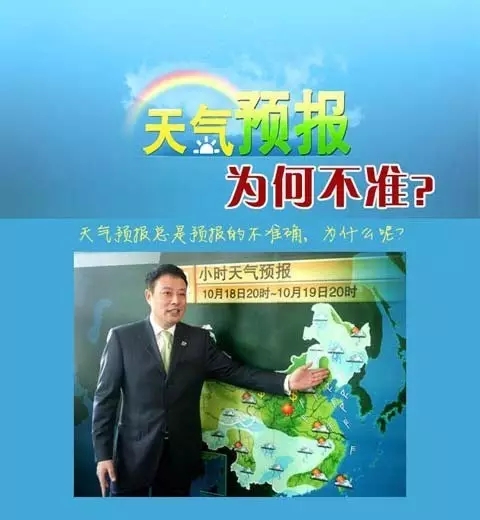The weather forecast is "unreliable"? It is possible that your feelings are wrong.
Since the flood season this year, heavy rainfall has frequently affected many places in China. Before the rainstorm comes, the meteorological department will release meteorological forecasts and early warning information through various channels, and sometimes when some forecasts deviate from the actual feelings of the public, they will inevitably be spit out. Forecasters abroad even have a pamphlet entitled "How do meteorologists keep a psychological balance in the face of public ridicule".
Ma Xuekuan, chief forecaster of the Central Meteorological Observatory, said that the so-called forecast is a forecast of future weather phenomena, which is definitely not 100% accurate, and it will never be 100% accurate. With the extension of forecasting time, the uncertainty of forecasting will gradually increase, or the accuracy of forecasting will gradually decrease. The stronger the rainfall intensity, the more difficult it will be to forecast. The forecast accuracy of 24 hours is slightly higher than that of 48 hours, and 72 hours is lower. The accuracy will decrease by 1-2 percentage points for each day of aging.
Why is the weather forecast inaccurate?
In response to the public’s complaint that the weather forecast is inaccurate, China Weather Network once produced a set of graphic reports "Why is the weather forecast inaccurate?" In response to the question, what factors affect the weather forecast? How can the weather forecast be accurate? How should the public scientifically understand the accuracy of weather forecast? Let’s take a look.

First, the subject of modern weather forecasting is still a young subject after all.
Although there were records of meteorological observation in China as early as the Shang Dynasty more than 3,000 years ago, the weather forecast based on modern science has only a history of more than 100 years, especially for the numerical forecast methods commonly used in the world, China began to explore and study in 1955, and the short-term numerical weather forecast was officially released in 1969. In just a few decades, we can’t expect it to be "foolproof".

Second, atmospheric movement is far more complicated than you think.
So far, people’s understanding of the laws of atmospheric movement is still very limited. There is a beautiful-sounding word that describes a cruel fact, and that is the "butterfly effect". "A butterfly in the tropical rain forest in the Amazon basin of South America, occasionally flapping its wings, can cause a tornado in Texas in two weeks." Butterflies flap their wings, not to mention the influence of urban heat island, greenhouse effect and complicated topography and geomorphology on the atmosphere, plus the inherent randomness of atmospheric movement itself. It is almost impossible to understand these complicated and complicated factors thoroughly and describe them accurately and in detail in the simulation operation. It can also be said that we can’t simulate the atmospheric evolution completely and truly, and we can only simulate it approximately and infinitely close to reality, so there are inevitably errors.

For example, if the weather forecast is compared to taking God’s pulse, then God’s cold is caused by several butterflies, who they are and what "tricks" they use respectively. It is difficult for you to list them in turn, so it is difficult to judge whether God’s symptoms are finished with a few sneezes, or when tears and runny nose are caught and coughs and sneezes are all in battle, you can’t tell which one to hit and which one to say!
Thirdly, whether the forecast is accurate is also limited by observation means.
The birth of satellites, radars, etc. is equivalent to giving forecasters a "clairvoyance". From then on, the trend of typhoons cannot escape human eyes, and sudden heavy rainfall within a few hundred kilometers is no longer a stubborn disease in forecasting. But in fact, these high-tech observation methods also have weaknesses.

For example, the polar-orbiting meteorological satellite is close to the Earth and has high resolution, but it is impossible to observe a specific area intently. When it deviates from this area in motion, the area temporarily becomes a "blind area" for observation, and some weather may happen just at this time. So, shit, I missed it.
Fourth, public understanding deviation and popular science propaganda are not in place.
There is another reason for feeling that "the weather forecast is not accurate", that is, the deviation of public understanding or the lack of popular science propaganda. For example, in meteorological monitoring, the data of an observation station should represent the situation of an area. Therefore, in the forecast, it can be predicted that there is rain in this area represented by a certain station, but the weather situation in this area is obviously not exactly the same.

"Sunrise in the east and rain in the west", even if there is only one road, the weather conditions may be different. Maybe you didn’t meet the rain when you were on the other side of the road, but you have to assert that the forecast is not reliable, and the meteorological department is really wronged, because it is obviously impossible for us to set up observation stations on every road and every block.
Even if we can accurately express the equations of atmospheric motion and set up observation stations in every block, we will still encounter "bottlenecks" in the next calculation.
It sounds simple and intelligent to use a computer to calculate, and the most advanced computer in the world, that is, the "big guy" whose calculation speed is tens of trillions of times per second, is located in the meteorological department. However, you should know that the amount of calculation and complexity of numerical forecasting can be said to be abnormal, and the smartest computer in the world will also be "scared", and it is difficult to achieve perfection and perfection when solving the equations of fluid mechanics and thermodynamics describing the weather evolution process. Its computing power still needs to be improved in terms of forecasting demand, and its operation may still be biased, which is why it is said that it is artificial correction.
Fifth, "Your feelings deceive your heart."
From the public’s point of view, the inaccuracy of prediction is related to people’s high psychological expectation and selective memory. In people’s life, the significance of weather forecast for daily matters such as dressing, traveling, traveling, etc. is not only a reference, but also a dependence. Therefore, people have high expectations for weather forecast, and they also think that the meteorological department is eating this bowl of rice. There is no reason not to give you an accurate and authoritative result.

Therefore, when the forecast is accurate, everyone thinks it is normal and natural, and naturally it will not be "unforgettable"; However, when the forecast is not accurate, it is often bitter and memorable because it affects the work and life arrangements. This is also an important reason why the weather forecast is always unreliable in everyone’s impression.
Is the weather forecast really unreliable?
From the forecaster’s point of view, the forecasting work should be restricted by the technical level and forecasting experience. In fact, the forecaster is really the most willing to tell the truth in the world. No one is more eager than the forecaster to predict accurately.

Statistics show that in 2015, the accuracy of 24-hour sunny and rainy forecast in China was 87.3%, and the accuracy of 24-hour maximum and minimum temperature forecast has exceeded 80%. The error of typhoon track forecast is 66 kilometers, and these data are in the forefront or leading level compared with the weather forecast of all countries in the world. So, if you think the weather forecast is always unreliable, then it may really be that you "feel wrong".
In a word, we should understand that weather forecasting is a limited science, which can be infinitely close to perfection, but it can never be 100% accurate.